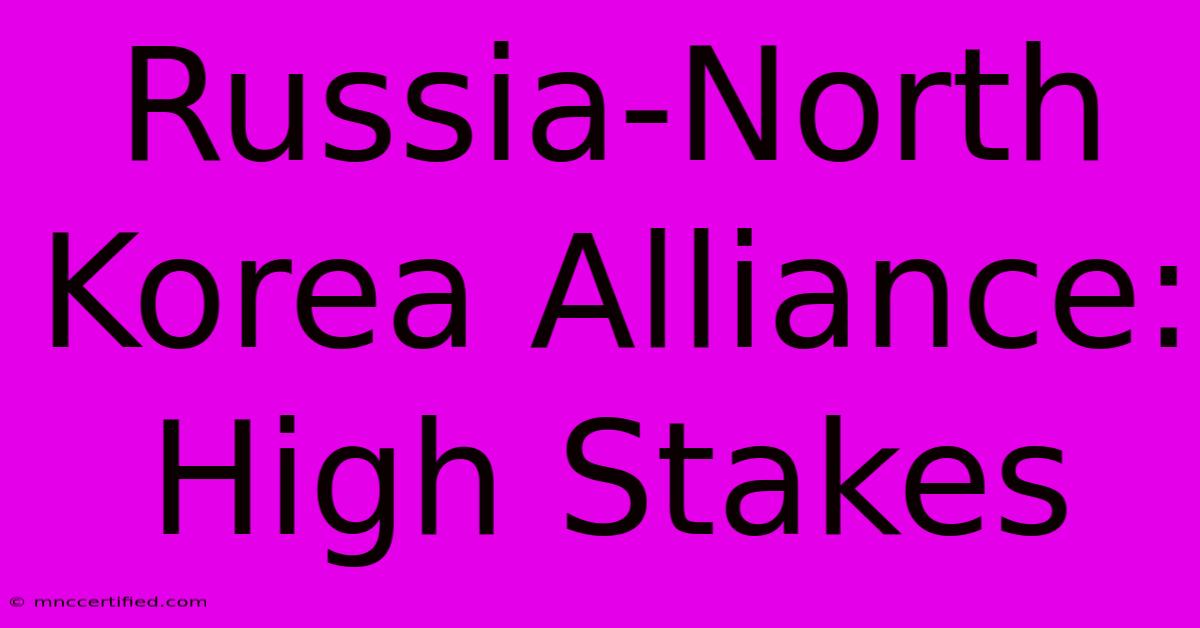Russia-North Korea Alliance: High Stakes

Table of Contents
Russia-North Korea Alliance: High Stakes
The burgeoning relationship between Russia and North Korea is a complex geopolitical chess game with potentially high stakes for the global order. This alliance, while not formally declared, presents a significant shift in the international landscape, raising concerns among Western nations and prompting intense scrutiny. Understanding the dynamics of this partnership requires examining its multifaceted motivations, potential consequences, and the broader implications for regional and global stability.
Motivations Behind the Alliance
Both Russia and North Korea are driven by a shared desire to counter what they perceive as Western hegemony. This shared antagonism forms the bedrock of their growing cooperation.
Russia's Perspective:
- Weakening Western Influence: Russia sees its alliance with North Korea as a tool to undermine the United States and its allies in the Asia-Pacific region. By bolstering a rogue state, Russia challenges the existing power structure and diverts attention from its own geopolitical ambitions.
- Military-Technical Cooperation: Russia is seeking to access North Korea's resources and potentially acquire advanced weaponry, particularly artillery shells, to supplement its dwindling stockpiles used in the Ukraine conflict. This exchange provides mutual benefits, bolstering both militaries.
- Counterbalancing Sanctions: Both nations are under significant international sanctions. This shared experience fosters cooperation and provides opportunities to circumvent these restrictions through mutually beneficial trade deals and technological exchanges.
North Korea's Perspective:
- Economic Survival: North Korea desperately needs economic assistance and access to resources to alleviate its chronic food shortages and economic hardship. Russia offers a potential lifeline, albeit a risky one, in this regard.
- International Recognition: Aligning with Russia provides North Korea with a degree of international legitimacy and recognition, albeit from a pariah state itself. This helps them avoid complete isolation on the world stage.
- Technological Advancement: North Korea can benefit from access to Russian technology and expertise in various fields, helping to advance its own military and technological capabilities.
Potential Consequences and Risks
The strengthening Russia-North Korea alliance presents numerous potential risks and consequences:
- Escalation of Tensions in Northeast Asia: The increased military cooperation between the two nations could lead to a dangerous escalation of tensions in the already volatile Korean Peninsula and surrounding regions. The possibility of further missile tests or military exercises increases significantly.
- Increased Arms Proliferation: The transfer of weapons and technology between Russia and North Korea could exacerbate the global proliferation of weapons of mass destruction and conventional weaponry, posing a threat to international security.
- Undermining International Norms: This alliance openly defies international sanctions and norms, weakening the international rules-based order and setting a dangerous precedent for other authoritarian regimes.
- Impact on Ukraine Conflict: The supply of artillery shells from North Korea to Russia could significantly prolong and intensify the conflict in Ukraine, undermining international efforts to achieve peace.
Global Implications
The Russia-North Korea alliance is not merely a regional issue; it has significant global implications:
- Challenge to the US and its Allies: The alliance directly challenges the influence of the United States and its allies in the Asia-Pacific region, leading to increased geopolitical competition and the potential for miscalculation.
- Shifting Global Power Dynamics: This partnership represents a significant shift in global power dynamics, with potential consequences for international institutions and alliances.
- Increased Uncertainty and Instability: The unpredictable nature of both Russia and North Korea increases global uncertainty and instability, creating a more challenging international environment.
Conclusion: Navigating a Complex Landscape
The developing Russia-North Korea alliance is a complex and evolving situation. Understanding the motivations, consequences, and global implications of this partnership is crucial for navigating the increasingly challenging geopolitical landscape. International efforts to address this alliance through diplomatic pressure and coordinated sanctions are vital to mitigating its potential negative consequences and promoting regional and global stability. The high stakes involved necessitate careful and proactive responses from the international community. Further research and analysis are required to fully understand the dynamic evolution of this strategic partnership and its lasting impact on global affairs.

Thank you for visiting our website wich cover about Russia-North Korea Alliance: High Stakes. We hope the information provided has been useful to you. Feel free to contact us if you have any questions or need further assistance. See you next time and dont miss to bookmark.
Featured Posts
-
Bernards Take Kelces Worst Game
Nov 19, 2024
-
Travis Kelce Street Style Meets Luxury
Nov 19, 2024
-
Trump Dance In The Sports World
Nov 19, 2024
-
Pregnancy Announcements Kerr Mewis
Nov 19, 2024
-
Astros Daikin Park New Name Same Home
Nov 19, 2024